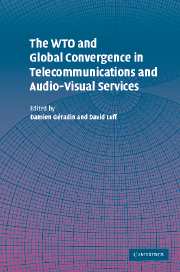Foreword
Published online by Cambridge University Press: 25 February 2010
Summary
The very recent dispute between Mexico and the United States concerning access pricing in telecoms by the former was, for most trade insiders, another dispute in the ever growing WTO docket. A deconstruction of this mundane phrase, however, should help raise a few eyebrows: telecoms, access pricing, compulsory third (WTO) party adjudication. Surely all of this seemed to be a distant future in the aftermath of the Tokyo Round. So what happened these last twenty-five years?
Essentially, domestic policies became more and more rational under the influence of exogenous parameters (technology) which greatly helped mobility of production factors around the world to reach unprecedented levels. Rationalisation of domestic policies meant, inter alia, rethinking the extent of the state along more or less economics-friendly lines.
Now, it is true that rationalisation did not occur everywhere and, even where it did, it evidenced different speeds. Regulatory diversity continues to be very much the case in most state expressions of societal-revealed preferences. This observation notwithstanding, however, it is this process of rationalisation that made it possible to discuss within and across national borders issues which remained ‘untouchables’ over the years.
Telecoms is one of the areas where the prevailing orthodoxy (general service means only state carriers can undertake such operations, natural monopoly, etc.) was put emphatically into question. Some states started a de-monopolisation process which, although looked at with suspicion by less than innocent bystanders, found imitators around the globe in record time.
There was, it is true, a growing discomfort with the fact that, in many democracies (there is not much room for public discomfort in nondemocracies), monopolies like telecoms were often used as outlets for dumping unemployed people.
- Type
- Chapter
- Information
- Publisher: Cambridge University PressPrint publication year: 2004

